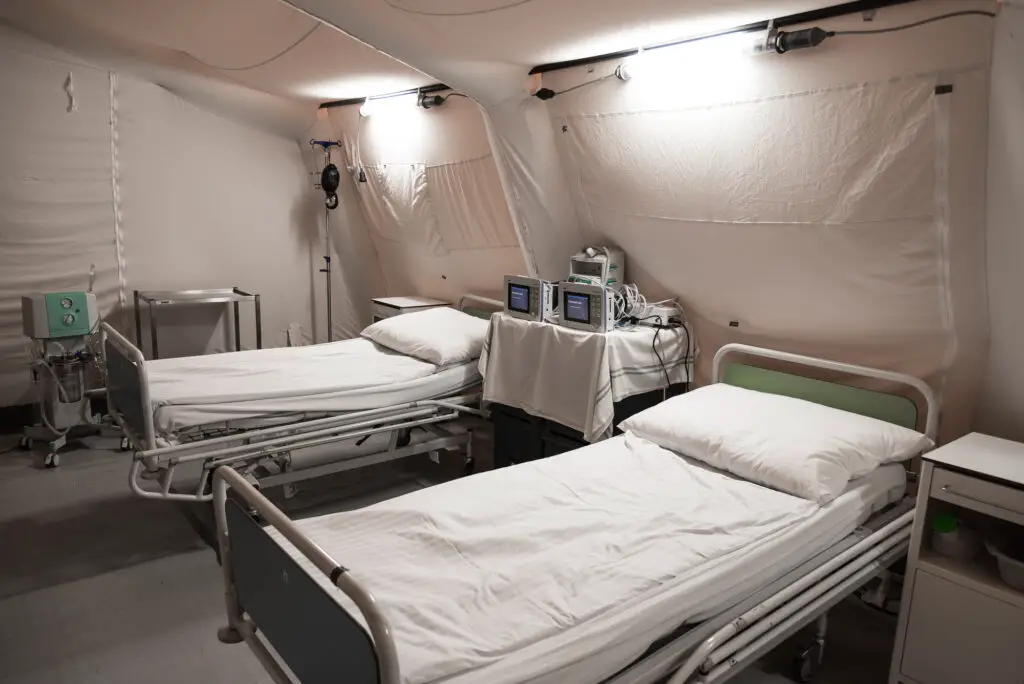Have you ever wondered what happens during a disaster when traditional healthcare facilities are unable to cope with the influx of patients? In such situations, mobile hospitals play a crucial role in providing emergency medical care. Mobile hospitals are fully-equipped medical facilities that can be set up quickly in disaster areas to provide treatment for the injured. They’re also staffed by healthcare professionals who work around the clock to ensure that patients receive the care they urgently need.
As events in the world have shown, disasters can strike anywhere, creating a need for immediate emergency response. In such situations, mobile hospitals stand out as one of the critical instruments in providing immediate and effective healthcare. Let’s discuss in depth the types of mobile hospital and their roles and benefits to emergency response.
Types Of Mobile Hospitals

Mobile hospitals come in different types, depending on the terrain, environment, and mobility requirements of an emergency situation. The primary types of mobile hospitals are:
- Air-Based Mobile Hospitals: Also known as flying hospitals, air-based mobile hospitals offer medical care services using aircraft as a mode of transportation. These hospitals are equipped with advanced medical equipment and technology and can provide medical services in flight as well as on the ground.
- Land-Based Mobile Hospitals: These are mobile hospitals that operate on wheels or are transportable by other land vehicles. They’re designed to be easily moved and set up in different locations, making them ideal for emergencies on land or as a military mobile hospital.
- Sea-Based Mobile Hospitals: Sea-based mobile hospitals provide medical services using ships as their mode of transportation. They’re equipped with medical facilities, equipment, and supplies and can provide medical services while underway or moored.
Air-based, land-based, and sea-based mobile hospitals all have unique features and benefits that make them well-suited to specific types of emergencies.
Features Of Mobile Hospitals

As previously mentioned, mobile hospitals are equipped with a range of features that enable them to provide comprehensive care in emergency situations. These features include:
- Specialized Medical Equipment: Most mobile hospitals are equipped with advanced medical equipment such as X-ray machines, ultrasound devices, and laboratory equipment. This allows healthcare professionals to diagnose and treat a wide range of medical conditions on-site.
- Professional Staff: Most mobile hospitals are staffed by skilled medical professionals who can perform various medical and surgical procedures. These procedures may include wound treatment, minor surgeries, and emergency resuscitation.
- Temporary Shelter: In addition to medical care, mobile hospitals provide temporary shelter for patients. They’re equipped with beds, bedding, and privacy curtains, creating a comfortable environment for recovery.
- Provision Of Food And Water: Mobile hospitals understand the importance of nutrition and hydration for patients’ well-being. They ensure that patients receive regular meals and access to clean drinking water, promoting their overall recovery.
Mobile hospitals are designed to be self-sufficient and adaptable to different emergency scenarios. Most of them are equipped with generators, water tanks, and storage facilities for medical supplies and medications. This ensures that they can function independently, even in areas with limited infrastructure or resources.
Benefits Of Mobile Hospitals In Emergency Response
Mobile hospitals play a crucial role in emergency response efforts, offering several significant benefits in providing healthcare swiftly and effectively, such as:
- Improved access to treatment for patients: Mobile hospitals are designed to reach areas with limited or compromised healthcare infrastructure. By bringing healthcare services directly to the affected communities, mobile hospitals ensure that patients have access to essential medical care when traditional healthcare facilities may be inaccessible or overwhelmed. This improves the chances of timely treatment, leading to better patient outcomes.
- Reduced burden on traditional healthcare facilities: During emergencies or large-scale disasters, traditional healthcare facilities often face an overwhelming influx of patients. Mobile hospitals, together with telemedicine, alleviate this burden by providing immediate medical assistance on-site, reducing the strain on local hospitals and clinics. This allows traditional facilities to focus on treating severe cases and providing specialized care, while mobile hospitals cater to less critical cases in a timely manner.
- Rapid response and deployment to disaster areas: Mobile hospitals are specifically designed for rapid deployment in disaster-affected areas. They can be quickly set up and operational within a short period, ensuring that critical healthcare services are available as soon as possible. This rapid response capability is essential in emergencies where time is of the essence, and delays can significantly impact the health and survival of affected individuals.
The benefits of mobile hospitals in emergency response are twofold: they improve access to treatment for patients and alleviate the burden on traditional healthcare facilities.
Conclusion
Mobile hospitals are indispensable in emergency response efforts. Their specialized features, benefits, and rapid response capabilities enable them to provide immediate, efficient, and accessible healthcare to affected communities. By improving access, reducing burden, and ensuring a swift response, mobile hospitals contribute significantly to the overall effectiveness and success of emergency healthcare delivery worldwide.
